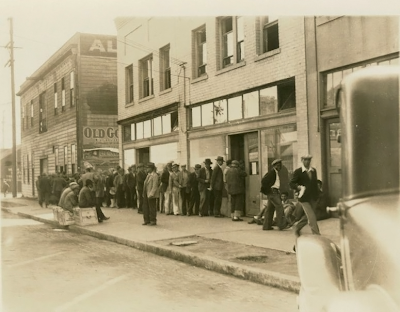The Restaurant Industry is a Conservative Republican Plantation
While thousands of fast-food workers were preparing to walk off their jobs earlier this summer to seek raises to $15 an hour, the industry’s corporate lobbyist, the National Restaurant Association, was celebrating a string of political victories blocking state minimum wage increases and preempting local sick day laws.
In June, the NRA boasted [3] that its lobbyists had stopped minimum wage increases in 27 out of 29 states in 2013. In Connecticut, which increased its state minimum wage, a raise in the base pay for tipped workers such as waitresses and bartenders vanished in the final bill. A similar scenario unfolded in New York State: It increased its minimum wage, but the NRA’s last-minute lobbying derailed raising the pre-tip wage at restaurants and bars. The deals came despite polls showing [4] 80 percent support for raising the minimum wage.
The NRA’s lobbying didn’t stop there. It also told members that it blocked [5] a dozen states this year from passing laws that would require earned paid sick leave, which is what New York City [6] and Portland, Oregon [7] adopted. Meanwhile, it boasted that six states, including Florida, passed NRA-backed laws that preemptively ban localities from granting earned and paid employee sick time.
“These are horrible things, but there are amazing things that are happening to change it,” said Saru Jayaraman, co-director and co-founder of the Restaurant Opportunities Centers United [8] (ROC), which has been working a dozen years to slowly change the industry’s exploitive business model and labor practices. “And there will be increasingly important stuff coming up.”
As fast-food workers across the country prepare for a second nationwide walkout [9] over wages on Thursday, most Americans have little idea how profitable [10] and politically aggressive the corporate mainstays [11] of America’s second biggest employer have become. While labor activists have had victories in 2013, such as New York and Portland passing sick leave laws, and New Jersey [12] poised to raise its minimum wage via a ballot measure this fall, the restaurant industry’s lobbying powerhouse is at war with the industry’s workers.
“It’s an old-boy network. It’s very old-school thinking. It’s very, very conservative,” said Paul Saginaw, founder of Zingerman’s food companies [13] in Michigan, which employes 600 people and unlike [14] the NRA, supports better benefits for employees like healthcare. “There has to be some pressure put out to provide better lives for people.”
Most Americans are unaware that millions of people who work in the industry—especially the 2.5 million fast-food preparers and servers who earn an average of $8.74 an hour, according to federal labor statistics [15]—are not just teens in their first job, but adults with families to support. They may not know there’s a separate minimum wage for tipped workers, $2.13 an hour, that hasn’t changed in 22 years—although 32 states have raised it slightly. They may not realize that they, as the restaurant-going public, subsidize owners via cash tips, even as the NRA routinely tells legislators its industry cannot afford to pay better wages or basic benefits.
Most Americans don’t know that restaurant salaries are so low [15] that the industry’s 12.2 million workers use food stamps at twice [16] the rate of the U.S. workforce, and are three times as likely to be below the poverty line. Or that women [17] earn less than men in similar jobs. Or that restaurants are among the biggest low-wage employers of people of color. Or that virtually every chain—except for In and Out [18], according to ROC—don’t want to pay living wages and benefits or offer real opportunities [19] for advancement.
Most tellingly, almost every national chain—from fast-food outfits such as Yum! Brands Inc. (Taco Bell, Pizza Hut, KFC) and McDonald’s to full-service dining such as Darden Restaurants Inc. (Olive Garden, Red Lobster, Capital Grille)—have reported [10] higher revenues, profits, margins and cash holdings to Wall Street analysts despite the recession, according to the National Employment Law Project. Giants like McDonalds had 7.8 percent revenue growth over the past decade, according to Gurufocus.com, a financial reporting site. Yum had 10-year revenues of 8.7 percent, and Darden’s 10-year revenues grew 9.1 percent.
But last winter, as the NRA was fighting minimum wage increases and paid sick leave, it was telling lawmakers that the industry could not afford to pay employees more. Yet this August, the NRA’s newsletter was predicting [20] another profitable year, where revenues would be up 4 percent compared to 2012. "Restaurant and foodservice sales are expected to reach a record high of $660.5 billion this year," another 2013 revenue forecast [21] on its website said.
[3] http://www.restaurant.org/News-Research/News/Majority-of-states-reject-minimum-wage-increases
[4] http://www.nelp.org/page/-/rtmw/uploads/Memo-Public-Support-Raising-Minimum-Wage.pdf?nocdn=1
[5] http://www.restaurant.org/News-Research/News/Cities-and-states-debate-paid-sick-leave
[6] http://www.huffingtonpost.com/2013/06/27/nyc-paid-sick-time_n_3507814.html
[7] http://nwlaborpress.org/2013/04/city-council-portland-sick-leave/
[8] http://rocunited.org/
[9] https://www.facebook.com/FastFoodForward
[10] http://nelp.3cdn.net/e555b2e361f8f734f4_sim6btdzo.pdf
[11] http://rocunited.org/files/2013/04/reports_darden.pdf
[12] http://www.nj.com/politics/index.ssf/2013/04/nj_voters_strongly_support_min.html
[13] http://www.zingermans.com/AboutUs.aspx
[14] http://www.restaurant.org/News-Research/News/NRA-files-brief-with-Supreme-Court-on-health-care
[15] http://www.bls.gov/iag/tgs/iag72.htm#earnings
[16] http://billmoyers.com/segment/saru-jayaraman-on-justice-for-restaurant-workers/
[17] http://www.nelp.org/page/-/rtmw/ROC_GenderInequity_ES.pdf?nocdn=1
[18] http://www.in-n-out.com/
[19] http://www.scribd.com/doc/115557026/2013-ROC-National-Diners-Guide-to-Ethical-Eating
[20] http://www.restaurant.org/News-Research/News/Economist-s-Notebook-Restaurant-sales-growth-will
[21] http://www.restaurant.org/News-Research/Research/Forecast-2013
Yum Brands Inc executive compensation was just shy of $43 million in 2012. The executives at that company have not, and will never do any work that earns that kind of compensation. They could pay their employees a living wage plus gold plated health care insurance and still make a very nice living. Yum Brands are not capitalists, they are rent seek plantation owners- redistributing the money earned by workers to themselves. Clarence Otis/Chairman and Chief Executive Officer of Darden (Olive Garden, Red Lobster, Capital Grille)
paid himself over $6 million in 2013. Total executive pay was $16 million, yet they have threatened to make life even harder for their employees rather than provide health care coverage. Clarence and his executive staff have never done more than $50k a year worth of actual work, they're plantation owners, just like Yum Brands. They would rather their employees collect food stamps, go without heat in the winter and forget about ever getting good dental care; what is important to them is giving working Americans the shaft so they can live in mansions and call people who point out what sleazeball bastards they are, commies.

















































